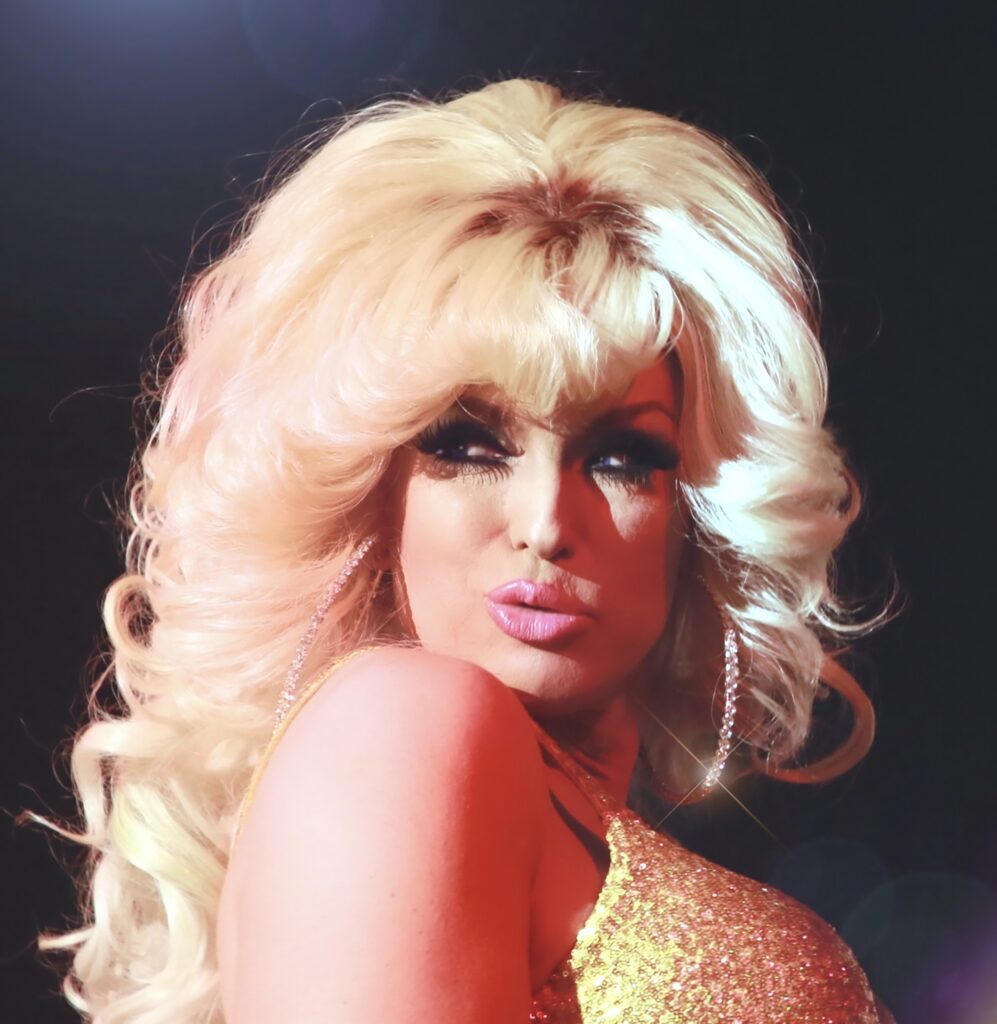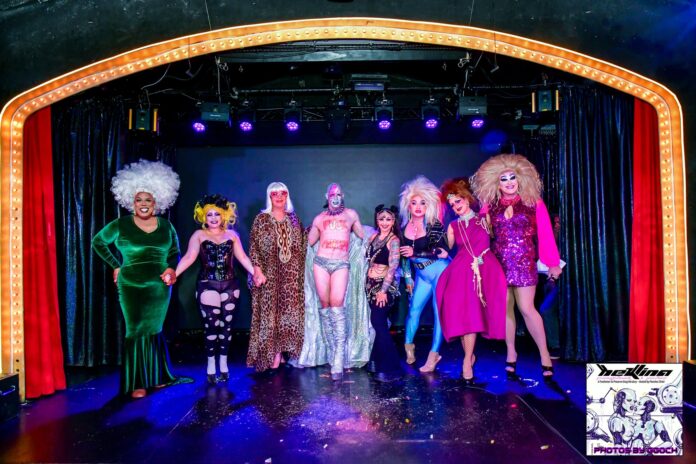Monday night’s packed Heklina Tribute extravaganza at 10-year-old SoMa drag club Oasis—a fundraiser to digitize the local legend’s mountain of physical recordings from her influential 1990s-2000s club T*Shack and beyond—kicked off with a showing of her brilliant 2003 version, with fellow icon Glamamore, of Björk’s “All is Full of Love” video. The crunchy, pixellating clip went viral after Heklina’s passing under tragic circumstances in 2023, its pre-smartphone low-resness adding an extra layer of nostalgia to a 20-year-old number based on a song from the previous decade.
The video was shown as an example of what the digitization project aimed to preserve and perhaps restore. (“We need a Heklina Criterion 4K Blu-Ray edition,” a friend quipped.) But hostess Peaches Christ cannily picked up on another thread, especially poignant on the day owner D’Arcy Drollinger announced that Oasis was closing at the end of the year, if it could last that long. The Heklina video was recorded at the Stud, another drag hotspot that nearly closed almost a decade ago. Peaches herself reminisced about coming to SF in the age of colorful Castro performance venue Josie’s Juice Joint, which shuttered in 1999, and coming into her own with her wild Midnight Mass movie screenings at the Bridge Theatre, which also no longer exists.
“Queer performance will always find a way to survive,” Peaches said. “But that doesn’t make it any less painful when we lose one of the few special places that allows us to express ourselves.” By way of symbolism, she pointed out a 21-year-old in the audience who had literally been onstage at T*Shack in the womb, when her mother Cricket Bardot performed onstage while pregnant. Peaches then went on to introduce several acts from vaunted performers, including Bardot, that resurrected that old anarchic T*Shack spirit with everything from bellydancing and David Bowie to classic horror clips and spewing bodily fluids.
In the end, the night was also a tribute to Drollinger, who opened the club with Heklina and Geoff Benjamin and took over from them in 2019, weathering COVID, sky-high rent, and all manner of challenges to keep the fabulous, consistent Best of the Bay-winner’s doors open. Throughout the night’s jaw-dropping performances, from the likes of Fauxniqiue, Glamamore, Trixxie Carr, Africa America, Matthew Martin, Becky Motorlodge, and Raya Light (coming back from an epic cancer battle), I couldn’t help thinking about how not just the city and its queer scene have changed in the last 10 years, but also drag itself—now a glitzy globalized entertainment industry, thanks to “RuPaul’s Drag Race” and its voracious production company World of Wonder.
While Oasis had become a frequents stop for “Drag Race” stars, it also kept doors open for events catering to marginalized communities, like Nicki Jizz’s brilliant Black-performer supporting “Reparations” night, and the Asheq party, catering to Middle Eastern/North African LGBTQ+ people, especially important as our very existence is questioned. Oasis is where you can put on a puppet-driven musical about queer dinosaurs, compete in an all-gender “dream” pageant, and watch absolute legends take some of their final bows. Heck, even 48 Hills threw one of our most fantastic galas there, and the club sometimes allowed me on the decks to DJ.

Ten years—exactly 11 if the venue closes on New Year’s Eve 2026 as planned—is a helluva run for a queer performance venue in this over-priced, increasingly sleepy and teetotaling city, where bars are restricted to closing at 2am, entertainment licenses are hard to come by, and gentrifiers complain at the slightest noise. The fact that a vibrant cohort of performers of all ages still can’t resist the urge to put on a show or throw a party is heartening proof that you can’t stifle queer culture.
Drollinger—performer, playwright, film-maker, international glamor girl, camp connoisseur—welled up when I called her Monday afternoon to talk about the closure announcement. “Marke, it’s really something,” D’Arcy said. “I guess I didn’t expect the outpouring of love and concern that’s happening after the announcement. I’m blown away by all the memories and support from the community coming in right now, while we’re trying to navigate this.
“It’s really hard for people to wrap their brain around. We’re not so rich. You go to Oasis and see all the people, and see all the lights, and it looks fab and expensive—and it is expensive. My team works hard to give people a glamorous experience. But the reality is that from the beginning we have just barely been breaking even. We’ve never turned a profit. We’ve paid our people, which I’m really proud of, and done whatever we could to keep our doors open for our wonderfully diverse audience. We spend our resources elevating the performers, making a space for everyone, doing things a lot of other venues don’t.
“It’s been a crazy and wonderful 10 years,” D’Arcy said. “Last year with did 352 events, and paid performers $800,000. That’s a terrific feeling, knowing you are helping artists survive, even just a little bit. But if we’re not operating at 90% capacity and sales every night, we’re not viable. You can have three great nights and then two slow nights will wipe that out. This isn’t special to us, of course, it’s pretty much how it is for every bar and club.
“After the pandemic, we had a little spike, we were excited to reopen the venue and there was a lot of energy. But slowly over time, people didn’t come out as much. People aren’t drinking as much, and bar sales are where we make our money. It is what it is, things change. We found ourselves falling deeper and deeper in debt, despite our fundraisers, and constantly pivoting, and an amazing crowd of dedicated and generous patrons. Some people come twice a week! It feels especially heartbreaking to let those people down.
“But it was not enough,” D’Arcy continued. “We launched our nonprofit Oasis Arts to underwrite some of the costs. But you know how nonprofits also cost money. In the end I depleted my own savings to keep us afloat, and that wasn’t much. I’m really just hoping we can hang on until New Year’s and find our crew other jobs. I didn’t just want to close down and not give people a chance to celebrate one last time, or bring that friend they’ve always been meaning to bring. One more party, one more chance to have an Oasis moment.”
Hanging on until New Year’s will require people to come out and support the venue—so go! Pay the cover and buy some drinks! (“We have a lovely selection of non-alcoholic beverages,” D’Arcy said.) And maybe some rich gay or gays (non-fascist, please) will write D’Arcy a $10 million dollar check to keep things going.
“It’s crucial to have someone championing marginalized trans and BIPOC artists right now,” D’Arcy concluded. “Most people who fun nonprofit organizations don’t consider drag and burlesque to be artforms, but they’re the foundation of queer culture. I want to see San Francisco continue to have an underground art scene. I’m there to explore it. But right now, this is where we’re at, and it’s very sad.”
See how you can help Oasis here.






